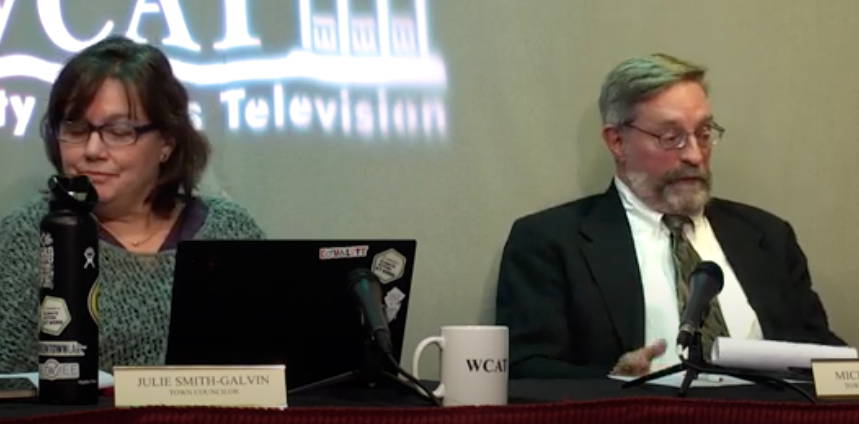By MARK SARDELLA
WAKEFIELD — The Town Council voted this week to pursue a “Climate Leader Communities” technical assistance grant that requires Wakefield to, among other things, commit to eliminating fossil fuel use in municipal buildings and operations by 2050, create a municipal “decarbonization roadmap” and adopt a zero-emission vehicle first policy.
Not all members of the Town Council were on board, however. Councilors Michael McLane and Edward Dombroski raised serious concerns related to the transparency of the commitments that come with the grant as well as the town’s financial ability to honor those commitments.
The motion to apply for the grant was made by outgoing Town Councilor Julie Smith-Galvin. She said that the state has announced a Green Communities 2.0 program called “Climate Leaders Communities” to support municipalities with grants that reduce municipal greenhouse gases using “zero over time” approach.
She explained that the “zero over time” approach means that as town-owned buildings, vehicles and HVAC systems come to the end of their normal lifespans, they would be replaced with “zero emissions” options.
She outlined the qualification criteria for applying to receive the grant. To apply, a community must meet six criteria:
1. Be a Green Community in good standing
2. Have a local body (sustainability committee, energy committee, etc.) that advises the municipality on clean energy/climate initiatives
3. Commit to eliminate fossil fuel use in municipal buildings and operations by 2050
4. Create a municipal decarbonization roadmap
5. Adopt a Zero-Emission Vehicle first policy
6. Adopt the Specialized Opt-In building code
Smith-Galvin noted that Wakefield had already met three of the qualifications (1,2 and 6). By applying for the grant, the town must commit that it will meet all six Climate Leader Community requirements within one year of the technical assistance grant award.
McLane asked Smith-Galvin if she had looked into how much more expensive an electric pumper truck for the Fire Department would be. He said that he had looked into it and found that they’re “almost twice as expensive” as traditional diesel-powered fire trucks. He further noted that the electric pumpers are backed up by a diesel-powered generator for when their battery runs out.
Smith-Galvin pushed back.
“I don’t know anything about electric pumpers,” Smith-Galvin admitted, but said that the Massachusetts Department of Energy Resources has been good about working with communities “and have not required anything unreasonable.”
McLane further questioned whether Smith-Galvin had fully vetted this plan with the Police and Fire Departments to see if they were on board with going to a fully electric fleet of vehicles. He said that he was concerned that the town was being rushed into a grant that will force the town into paying higher costs for needed items.
“I’m very skeptical about the costs,” McLane said.
Councilor Robert Vincent said that he shared McLane’s concerns with the added cost of electric vehicles like fire trucks. But he said that after speaking to several “Green Communities” officials at the state level, he was prepared to support the grant application.
Dombroski objected to the fact that the Town Council was hearing this proposal for the first time at the end of a four-hour meeting, adding that there should have been a wider public discussion of the financial and practical ramifications of the commitments the town will be required to make.
“I think it’s a dangerous idea at this point in time,” he said. “I think it would be elected official malpractice to commit the town in this way. It feels like it’s being forced through at the eleventh hour.”
Melissa Eusden of the Environmental Sustainability Committee said that the ESC voted in February to go forward with the Climate Leaders program. She said that it was important to make a commitment to address climate change, adding that the town would be eligible for grant money through the program.
Chairman Jonathan Chines denied that Wakefield was being required to commit to anything, asserting that the town was just being asked work on policies for the sake of getting a technical grant.
“I don’t see this as risky,” he said, maintaining that if the goals turn out to be infeasible, the town doesn’t have to adopt them.
McLane strongly disagreed. The vote that the Town Council was being asked to take, he said, was to commit the town to these climate policies.
Dombroski agreed.
“This is not just exploring,” he said, noting that the town would be required to commit to all six criteria as a condition of accepting the grant.
Vincent suggested that the town could work on these goals independently and then apply for the grant next year. But Eusden said that without the grant, the town would have no impetus to pursue these climate goals.
Smith-Galvin said that she was enraged by Dombroski’s comment that approving the proposal would be elected official malpractice.
“Climate change is an existential issue,” she insisted. “This is where the world is going.”
The Town Council voted to instruct Town Administrator Stephen P. Maio to apply for the grant using the following language:
“On Monday, April 8, 2024, the Town Council voted in favor of applying for a Climate Leaders Community Technical Assistance Planning Grant to assist Wakefield in preparing a Municipal Decarbonization Roadmap. The Council did so with the knowledge and understanding that Wakefield is committed to meeting the certification requirements (three of which are already met) within a year of grant award.”
Voting in favor were Town Councilors Smith-Galvin, Mehreen Butt, Jonathan Chines, Anne Danehy and Robert Vincent. Opposed were Dombroski and McLane.





